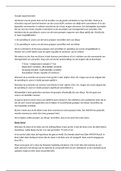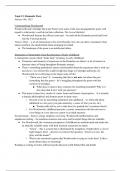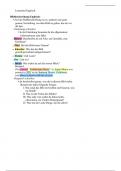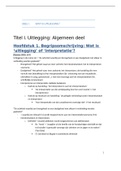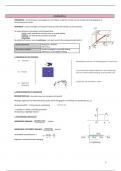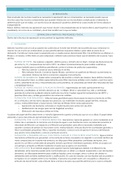PAPER THREE | GLOSSARY
Observation: Involves the precise measurement of naturally occurring behaviour in
an objective way. Observers may be disclosed so subject know they are being
studied, or undisclosed (hidden/covert). Observers may be participants in the study
or may not be. (S= High ecological validity. W= Consent)
Naturalistic Observation: Involves the recording of spontaneously occurring
behaviour in the subject's own natural environment
Experiment: An experiment is a scientific way of testing a hypothesis. This involves
investigating an idea a psychologist has about the causes of behavior. There are at
least two conditions and it can establish a cause effect relationship between the
variables.
Lab Experiment: Laboratory experiments take place in a psychology lab, usually a
special room set up in a university or research institute. (S= Controls extraneous
variables, easy to replicate. W= Low ecological validity)
Field Experiment: A field experiment takes place in an ordinary, everyday
environment, such as on the street, in a subway station, at a shopping mall, or in a
classroom. IV manipulated. (S= High ecological validity. W= Hard to control
extraneous variables)
Natural Experiment: A natural experiment is an experiment in which the change in
the independent variable occurs naturally. IV occurs naturally. (S= High ecological
validity. W= One time events, hard to replicate.)
Case Study: Idiographic method involving in-depth and detailed study of an
individual or particular group, often applied to unusual or valuable examples of
behaviour which may provide important insights into psychological function or
refutation of psychological theory. It utilises multiple research methods and cannot
be replicated.
Interview: Self-report techniques in which the researcher can ask the participant
questions.
Focus Group: A group of respondents are interviewed together, the discussion is
facilitated by a researcher. (S= Gathers qualitative data. W= Social desirability.)
Structured Interview: Questions have a set list of questions that are asked in a
specific order, the researcher cannot deviate from the list. Questions are primarily
closed ended. (S: Easy to replicate, quick to conduct. W= Not flexible, lack
qualitative data.)
Observation: Involves the precise measurement of naturally occurring behaviour in
an objective way. Observers may be disclosed so subject know they are being
studied, or undisclosed (hidden/covert). Observers may be participants in the study
or may not be. (S= High ecological validity. W= Consent)
Naturalistic Observation: Involves the recording of spontaneously occurring
behaviour in the subject's own natural environment
Experiment: An experiment is a scientific way of testing a hypothesis. This involves
investigating an idea a psychologist has about the causes of behavior. There are at
least two conditions and it can establish a cause effect relationship between the
variables.
Lab Experiment: Laboratory experiments take place in a psychology lab, usually a
special room set up in a university or research institute. (S= Controls extraneous
variables, easy to replicate. W= Low ecological validity)
Field Experiment: A field experiment takes place in an ordinary, everyday
environment, such as on the street, in a subway station, at a shopping mall, or in a
classroom. IV manipulated. (S= High ecological validity. W= Hard to control
extraneous variables)
Natural Experiment: A natural experiment is an experiment in which the change in
the independent variable occurs naturally. IV occurs naturally. (S= High ecological
validity. W= One time events, hard to replicate.)
Case Study: Idiographic method involving in-depth and detailed study of an
individual or particular group, often applied to unusual or valuable examples of
behaviour which may provide important insights into psychological function or
refutation of psychological theory. It utilises multiple research methods and cannot
be replicated.
Interview: Self-report techniques in which the researcher can ask the participant
questions.
Focus Group: A group of respondents are interviewed together, the discussion is
facilitated by a researcher. (S= Gathers qualitative data. W= Social desirability.)
Structured Interview: Questions have a set list of questions that are asked in a
specific order, the researcher cannot deviate from the list. Questions are primarily
closed ended. (S: Easy to replicate, quick to conduct. W= Not flexible, lack
qualitative data.)

